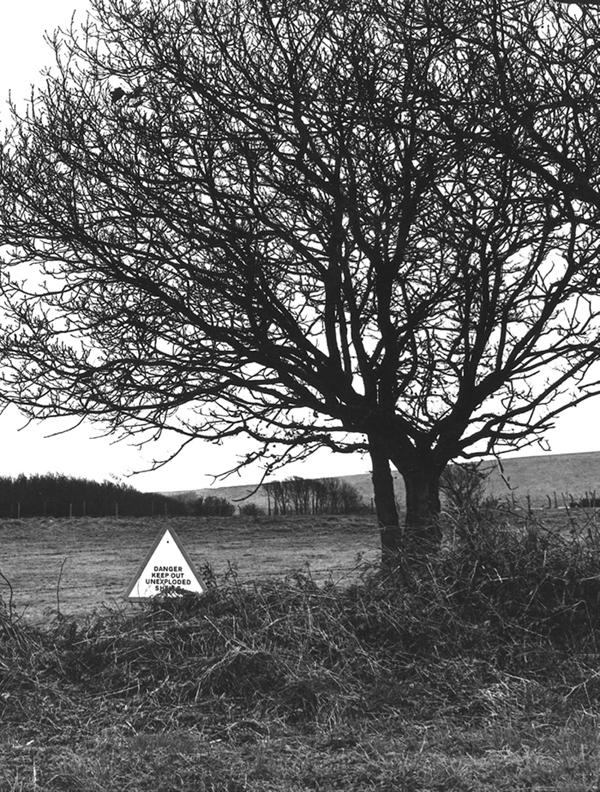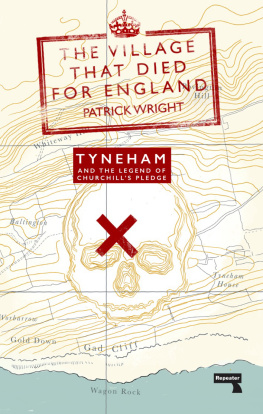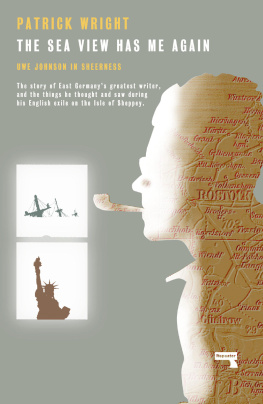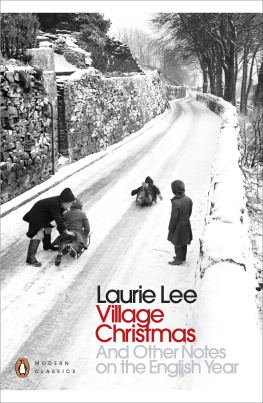An infinitely subtle parable about the politics of landscape Wright makes a dazzling array of connections to create what is really a masterpiece of English irony.
RICHARD BRADLEY, ASSEMBLAGE
Ostensibly the story of Tyneham, a Dorset village that was evacuated in 1943 to make way for the D-Day preparations and whose residents were never allowed to return, despite Winston Churchills promise. For Wright however, detail is everything and he clambers over the locked gates and barbed wire fences to discover a deep England of eccentric squires, quasi-fascistic communes and neolithic pathways.
BILLY BRAGG, GUARDIAN
Exhilarating In his powerful anatomy of the idea of English Pastoral, Wright relishes its collision with the harsher realities of rural life and the metallic intrusions of the modern world.
JANE DUNN, OBSERVER
Possibly the best book about this country ever written.
DAVID HAYES, NEWSTATESMAN
What makes it sensational is Wrights understanding that this unreal battle over a perfect English village of the mind is a symbolic affair; that the partiesthough no doubt they would be horrified if they knew itare all theorists, and that even something as palpable and no-nonsense as a hill or a tank in a palpable, no-nonsense country like England is a competing ideological construct: and that the fight is for meaning.
MICHAEL HOFMANN, FOR THE INDEPENDENT ON SUNDAY
An extraordinary protracted narrative of slow encroachment, spirited resistance, collaboration and defeat, and he tells it with all the vividness and zest for its mad life which a novelist might bring to some much more likely antiquarys tale of mystery and imagination.
FRED INGLIS, TIMESHIGHEREDUCATIONSUPPLEMENT
His eccentrics and idealists, local campaigners and passive farmworkers may never get to the pages of conventional history. But in telling the story of their battle for a lost paradise, he has struck pure gold.
DAVID ROBINSON, SCOTSMAN
Wright is, as ever, a finder, a noticer, a powerful sustainer of argument. He brokers the most unlikely connections: Llewelyn and the tank, chalk strollers and local fascists.
IAIN SINCLAIR
A beautifully written exploration of Englishness, unpicking a litany of lost causes and passionate eccentrics with the steadiest of hands.
ADAM THORPE, GUARDIAN
A superb exploration of Anglo-Saxon attitudes to the landscape and its inhabitants.
COLIN WARD, NEWSTATESMAN
For Claire, Edward, Nicholas and Richard, who still prefer Chapmans Pool to the Tank Museum, and for Dylan and Ethan, who have yet to decide.

Approaching Tyneham, 1989 (Andrew Watson).
A NOTE ON EDITIONS
The Village that Died for England was first published in hardback by Jonathan Cape in 1995, and by Vintage in paperback the following year. A revised edition, published by Faber in 2002, included new material and also reinstated some passages cut from the Cape edition in order to shorten the book. I have made further adjustments since then. While concerned to leave the book in its own time, I have not managed entirely to confine additions to the new prologue and occasional footnote.
April 2021
The corner of a corner of England is infinite and can never be exhausted.
Hilaire Belloc, 1906.
England is already in a state of inferiority by reason of the fact that she cannot train her troops in her own territory. If the English wanted to open up wide spaces within their own frontiers, theyd have to sacrifice too many country houses.
Adolf Hitler, August 1941.
PROLOGUE 2021: THE CASE FOR GETTING UP JOHN CAREYS NOSE
Bluebells, and foxes, and primroses, and lovely trees, dappled light, nightingales, all that sort of thing. Youll be able to breathe there.
Adam Thorpe, Pieces of Light (1998)
The basic story is easily summarised. Before it was consigned to the afterlife surveyed in this book, Tyneham was a little village looking out onto the English Channel from a valley on the Dorset coast. Appreciated by visitors as one of the treasures of the peninsula known as the Isle of Purbeck, it possessed a fine Elizabethan manor house inhabited by a squire who was both a gentleman and a naturalist, a one-room schoolhouse, a small, partly medieval church with a Coronation Oak outside, and a rectory to the south of Post Office Row. All this was brought to an end shortly before Christmas in 1943, when the remaining inhabitants were hurriedly evacuated so that the entire site could be used by British and American troops practising for the D-Day landings.
The inhabitants left their accustomed world on the understanding that they would be allowed to return once the war was over. Though not conveyed in the letter sent to those about to be evicted in the National Interest by Major-General C.H. Miller of Southern Command,died for D-Day must be retained permanently as part of the Royal Armoured Corpss tank gunnery range. Financial compensation was paid and, since many of the displaced were not property owners, funds were released so that a special estate (Tyneham Close) could be built for them at Sandford, some miles inland, without disturbing the already long queue for council housing.
For some of the displaced this was sufficient reward for a sacrifice that was surely small compared with that made by so many others during the war against fascism. Yet Tyneham would be remembered with a growing sense of injury by others among its dislodged inhabitants. There had, as this book describes, been intense local agitation from the Hands Off Purbeck Campaign Committee, which formed in 1947 to oppose unwarranted War Department infiltration Protests were renewed in the late Sixties, thanks partly to the intervention of a volatile young campaigner who would later go on to become chairman of the national Open Spaces Society. Having learned his abrasive methods of agitation as an adolescent member of the far-right League of Empire Loyalists, Rodney Legg forcefully resuscitated the campaign, remobilising the memory of Churchills pledge and kickstarting a Tyneham Action Group that first went into action in the eventful year of 1968.
In reality, as readers will discover in the second half of this book, Legg had galvanised an impossible coalition in which members of the traditional county establishment tried, unsuccessfully, to make common cause with animal welfare campaigners, former labourers, ecologists, anti-hunt activists, footpath militants, suspected rural fascists, and at least one UFO-spotting admirer of the Great Beast Aleister Crowley. The Ministry of Defence, as the War Office was by then known, held its ground, but a legend was revived as the campaigners battled on, fighting one another as vigorously as they engaged the external enemy in Westminster and Whitehall.
Once expropriated, the village that had previously been only one among others became exceptional not just a ghost village but a memorial landscape: a place of observances which, like the two-minute silence that had been such a feature of inter-war Armistice Day ceremonies, allowed every participant to find his or her own way into a shared sense of loss. It was, to be sure, not just John Gale, the afflicted bipolar journalist and author of Clean Young Englishman (1965), who came here to think about what his life might have been before the obliteration descended. Tyneham was both extinguished and, by the same measures, launched into a new life as every visitors lost or shattered homeland.
Next page











